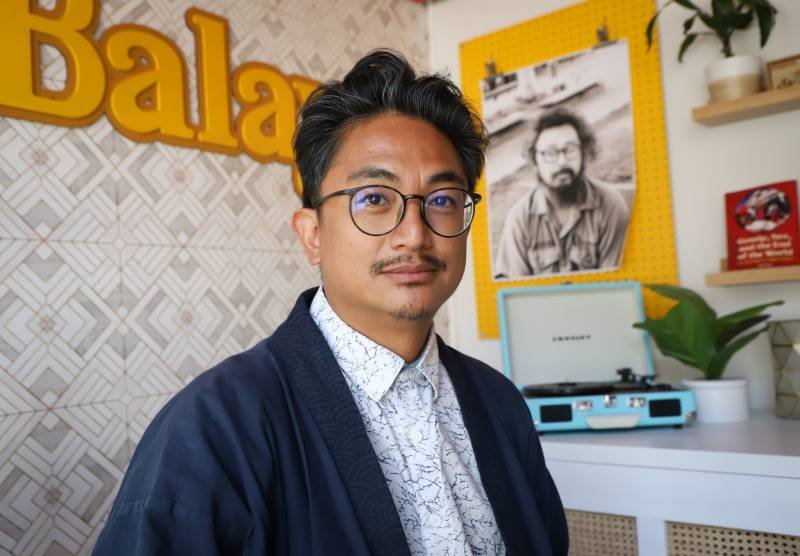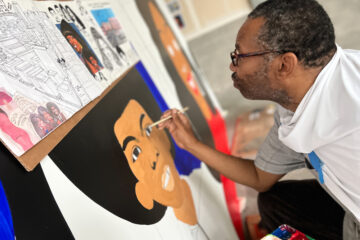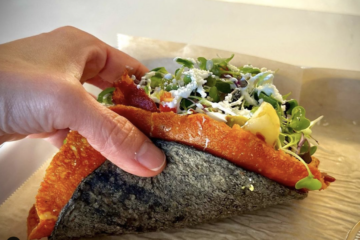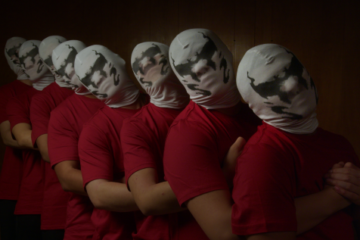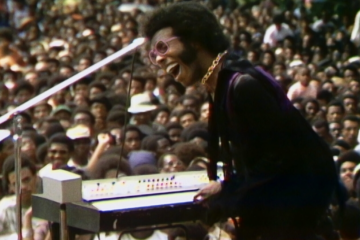San Francisco Nonprofit Looks to Revive SoMa with Filipino Culture
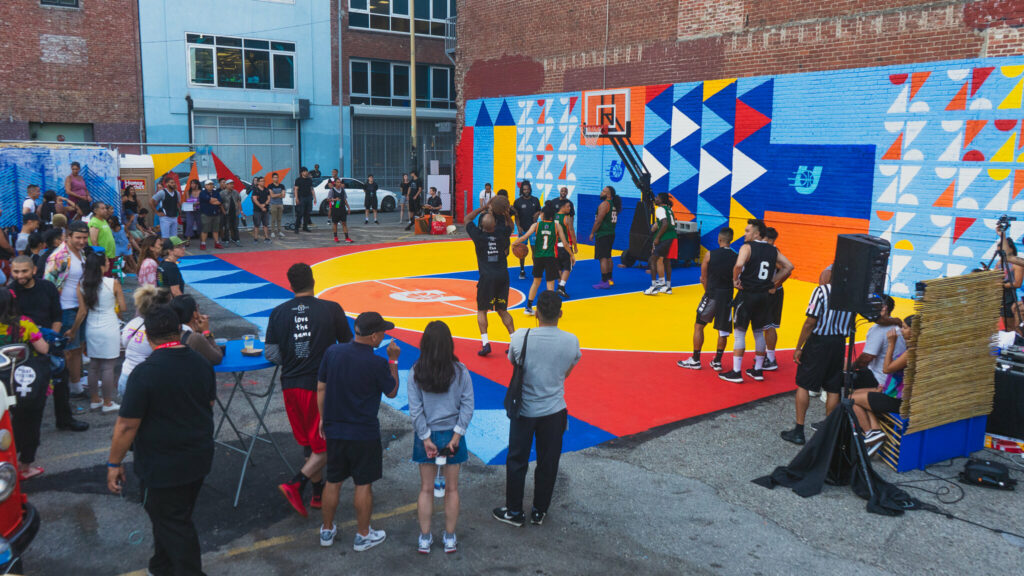
Kapwa Gardens in SOMA Pilipinas. The outdoor space hosts vendor pop-ups, live music, public screenings, cultural activities, and more. (Photo provided by Kultivate Labs)
by Alexandra Martinez, Prism
This story originally appeared on Prism.
The vacant storefronts along San Francisco’s South of Market Mission Street Corridor could soon be filled with more Filipino businesses, thanks to the nonprofit economic development and arts organization Kultivate Labs.
The city’s South of Market neighborhood (affectionately referred to as “SoMa” by locals but also known as the Filipino Cultural District) has been in desperate need of revitalization due to massive tech market layoffs spurred by the pandemic, along with a citywide retail exodus and the shuttering of hundreds of local businesses.
“The economy was white hot [before the pandemic],” said Desi Danganan, the founder and executive director of Kultivate Labs. “Everybody wanted to set up shop in San Francisco, and space was a very scarce commodity. Post-pandemic that completely went 180.”
Danganan, a self-proclaimed “serial entrepreneur,” created Kultivate Labs in 2016 to revive and preserve the heritage of SoMa, attract more Filipino people to the area, and create a thriving commercial corridor for historically overlooked communities. When he saw the impact of the pandemic, he knew bringing in new businesses from underserved communities would be just what the city needed.
Before Danganan stepped in to try to address the issue, there had been no concerted effort by the city to attract Filipino businesses or support any of the Filipino businesses in the San Francisco downtown area. According to Danganan, San Francisco went from a commercial vacancy of single digits to a citywide 30%, and in certain parts of SOMA, up to 50%. Since then, Kultivate Labs has brought in eight businesses, all of which are Filipino, including restaurants and clothing stores.
Local Journalism for Working stiffs
We write for the poets, busboys, and bartenders. We cover workers, not ‘tech’, not the shiny ‘forbes 100 bullshit’. We write about the business on your corner and the beer in your hand. Join the Bay's best newsletter.
“First, [we were] trying to carve out space for Filipino entrepreneurs, but now space is not really the issue,” said Danganan. “It’s really about leveraging the activities of the Filipino cultural district. Before, we were just trying to squeeze in, and now, we’re the only ones who want to come in and try to revive the area.”
The organization, now in its seventh year, will celebrate their recent accomplishments with their annual Filipino creative market, UNDISCOVERED, San Francisco’s largest market of its kind. This year they will honor the 50-year anniversary of hip-hop with three block parties on Aug.19, Sept. 16, and Oct. 21. The block party theme celebrates hip-hop’s past, present, and future exchanges with Filipinos and Filipino Americans.
Kultivate Labs will master leases for a year through its Anchor Creatives and Entrepreneurs (ACE) program while they work with pop-up vendors to get their business up and running with sustainable revenue. The goal is to help business owners sustain a long-term lease and then transfer the lease to them with the building’s landlord. The flexibility will make a difference for community members who are still struggling amid an uncertain commercial real estate market. In addition, Kultivate Labs provides six months of adaptive coaching to create a sustainable business model for the owners.
Danganan said he always knew he wanted to bring an arts presence to the community. Kultivate Labs has facilitated artist grants, space, and other resources for pop-up businesses, a free concert series, and a creative market. In their 2022 season, the organization saw $130,000 alone in economic activity through UNDISCOVERED. Artists say the opportunities have allowed them to develop their talents and connect with collaborators, enriching the Bay Area culture.
“[Working with Kultivate Labs] made us feel like we weren’t so alone in what we’re trying to accomplish,” said Joseph Alcasabas, co-owner of Uncle Tito, a Filipino-American restaurant in San Francisco. “We’re able to put our upbringing and make this love letter per se to the generation before us—our parents, our grandparents—and trying to bridge those gaps for our parents’ generation with our children’s generation because they’re not going to have the same Filipino experiences that we grew up with as first-generation Filipino Americans.”
Danganan grew up in Southern California, where he was accustomed to seeing spaces for Japanese, Chinese, and sometimes Vietnamese communities, but never his own Filipino community. Through Kultivate Labs, Danganan said he has witnessed the importance of creating a fixed retail space for Filipino people.
“You think, are we just invisible?” said Danganan. “Why is there no kind of space for us to be who we are? That’s what’s kind of driven me personally, is wondering why is there no Filipino enclave? … It is important to know that we are appreciated, that we are given money by the city to take over the streets.”
Before SoMs’s Filipino cultural district, Filipino people in San Francisco aggregated in Manilatown along Kearny Street on the border of Chinatown. There are conflicting records on how many Filipino people lived in the area in the 1920s and 1930s, but all sources agree that the area served as a commercial center for the Filipino community and featured restaurants, cafes, barbershops, and pool halls serving as meeting centers for recently immigrated Filipino people.
The Filipino community in San Francisco is also no stranger to gentrification. The “I-Hotel,” a housing and commercial center for decades, was the victim of a brutal mass eviction in 1977. Decades later, the SoMa area was taken over by luxury housing and office developments.
Danganan’s work in recent years has attracted more Filipino people back to the SoMa neighborhood, especially Filipino artists and creatives. As an entrepreneur, Danganan recalls never wanting to do anything that was blatantly or explicitly Filipino because he did not want to pigeonhole himself into a market with little support.
“Fast forward, now I’m seeing a whole new breed of entrepreneurs that are just loud and proud of being Filipino,” said Danganan. “I used to own a restaurant that was actually a really well regarded restaurant here in San Francisco, but we never wanted to call ourselves a Filipino restaurant because we thought that was going to be a really bad business decision because who wants to eat Filipino food? And is there a market for it? But lo and behold, a decade later, there’s a huge market for it. And the more Filipino you are, the more coveted you are. You don’t even have to highlight the names of the dishes and anglicize them. Just keep it real. That’s what people want.”
Danganan says other communities trying to retain their cultural centers can follow their model by starting with big events to create momentum. Next, Danganan suggests identifying winning business concepts, using resources to support them and get them off the ground, and establishing roots in the cultural district. He hopes that Kultivate Labs can partner and work with communities outside of San Francisco facing the same type of economic displacement to use their framework and retain their cultural impact in the cities they’ve helped build.
One thing Danganan is cognizant of is getting pushed out of the neighborhood by real estate interests after popularizing and revitalizing the neighborhood, which has happened in Williamsburg in Brooklyn, New York; Wynwood in Miami; and other neighborhoods across the country.
“[My biggest fear is] someone else who’s willing to pay three times the rent moves in and then benefits from all the sweat our community put in to revive the neighborhood,” said Danganan. “This happens in all kinds of different economic cycles where creatives and people of color make things cool, and they get pushed out. The most complicated thing for us in creating this program is also working for landlords to shift their perspective with pop-ups. They’re just looking at the pop-ups to fill space temporarily, but we’re trying to get them to think that once we have a pop-up in here, what we’re really doing together is incubating them.”
Prism is an independent and nonprofit newsroom led by journalists of color. We report from the ground up and at the intersections of injustice.

Howdy! My name is Katy Atchison and I'm an Associate Editor for Broke-Ass Stuart.
I want to take the time to say thank you for supporting independent news media by reading BrokeAssstuart.com. Supporting independent news sources like Broke-Ass Stuart is vital to supporting our community because it amplifies the voices of a wide variety of diverse opinions. You also help support small businesses and local artists by sharing stories from Broke-Ass Stuart.
Because you're one of our supporters, I wanted to send over a pro-tip.
Our bi-weekly newsletter is a great way to get round ups of Broke-Ass Stuart stories, learn about new businesses in The Bay Area, find out about fun local events and be first in line for giveaways.
If you’d like to get our newsletter, signup right here, it takes 5 seconds.



